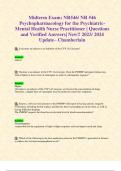Midterm Exam: NR 546/ NR 546 Psychopharmacology for the Psychiatric -
Mental Health Nurse Practitioner | Questions and Verified Answers| New!! 2023/ 2024 Update– Chamberlain Q: Is nicotine an inducer or an inhibitor of the CYP 1A2 enzyme? Answer: inducer Q: Nicotine is an inducer of the CYP 1A2 enzyme. Does the PMHNP anticipate Joshua may need a higher or lower dose of ol anzapine to achieve a therapeutic response? Answer: Higher -Nicotine is an inducer of the CYP 1A2 enzyme, so it lowers the concentration of drugs. Therefore, a higher dose of olanzapine may be needed to control his symptoms. Q: Ernesto, a 60 -year-old, presents to the PMHNP with report of having anxiety, frequent occurrences of feeling frozen in place and like his heart is pounding out of his chest, as well as having difficulty sleeping. The PMHNP suspects the client has an elevated level of which n eurotransmitter? Answer: Norepinephrine -responsible for the regulation of fight or flight responses and can impact mood and sleep. Q: Which of the following is the best medication class for the PMHNP to prescribe for Ernesto to address his elevated norepinephrine levels? Answer: selective serotonin reuptake inhibitor would block the reuptake of serotonin, leaving a larger amount of serotonin available. Increasing the amount of serotonin would help regulate the feelings of fear and anxiety. Reducing the occurrence of fear would help reduce the release of norepinephrine. A serotonin and norepinephrine reuptake inhibitor would preven t the reuptake of norepinephrine, which would not reduce the level of norepinephrine as needed. Benzodiazepines increase the levels of GABA and do not impact norepinephrine. A monoamine oxidase inhibitor would increase levels of norepinephrine. Q: During a follow up appointment after 4 weeks, the PMHNP should assess for the need to add which medication to Ernesto's treatment plan? Answer: The nurse should assess for sexual dysfunction and anticipate the potential need for a phosphodiesterase inhibito r such as sildenafil (Viagra). -After 4 to 6 weeks, the client should be experiencing full effects of the SSRI, so the need for a short -term medication like a benzodiazepine or a beta blocker are not anticipated. St. John's Wort is contraindicated with an SSRI and can cause serotonin syndrome. Q: Glu Answer: Glutamate -amino acid -excitatory neurotransmitter -"workhorse" of the brain -can affect almost every neuron in the brain -affects: energy, memory, learning, neural plasticity -relay sensory info. and regulate spinal and motor reflexes -too much: schizophrenia, epilepsy, mania -receptors: NMDA, AMPA Q: GABA Answer: inhibitory neurotransmitter -decrease neuroexcitability across the brain -"chill", take the edge off stress, help people calm down, relax, destress, sleep -to little: may experience anxiety or schizophrenia -slows down everything, even breathing -affect executive function and motor coordination, increase risk for accidents -Increased levels of gamma -aminobutyric acid have a calming effect. Q: 5HT Answer: Serotonin -help regulate mood -makes relaxed, comfortable, decreases stress, regulate sleep, arousal, libido, aggression, pain perception Q: NE Answer: norepinephrine -monoamine neurotransmitter -focus and productivity -too much due to stress, meds, caffein, stimulants can cause: nervous, antsy, affect focus Q: DA Answer: dopamine -monoamine neurotransmitter -regulate mood -associated with ex ecutive function, ability to perform well, be organized, emotional intelligence -movement and coordination -to little: lose pleasure, interest, alertness, self -confidence, parkinson's disease -to much: schizophrenia and psychosis -reward center: can lead t o addiction -has own pathways Q: Ach Answer: acetylcholine -in CNS: affects arousal, motivation, attention, learning, REM sleep, impacts sleep, pain perception, memory -in PNS: makes you sweat and salivate -link between brain and muscles -not enough: Alzheimer's, Parkinson's, Schizophrenia -too much: Depression -Role in addiction -Receptors: nicotinic & muscarinic Q: Histamine (Neurotransmitter) Answer: Histamine impacts alertness, pain sensation, and inflammatory responses; increased levels result in depression. Q: Melatonin (neurotransmitter) Answer: Act at MT1 -3 G-protein coupled receptors Sleep/wake cycle insomnia: melatonin agonists Q: Psychotropic drug metabolism may be impacted by factors such as: Answer: -age -smoking




